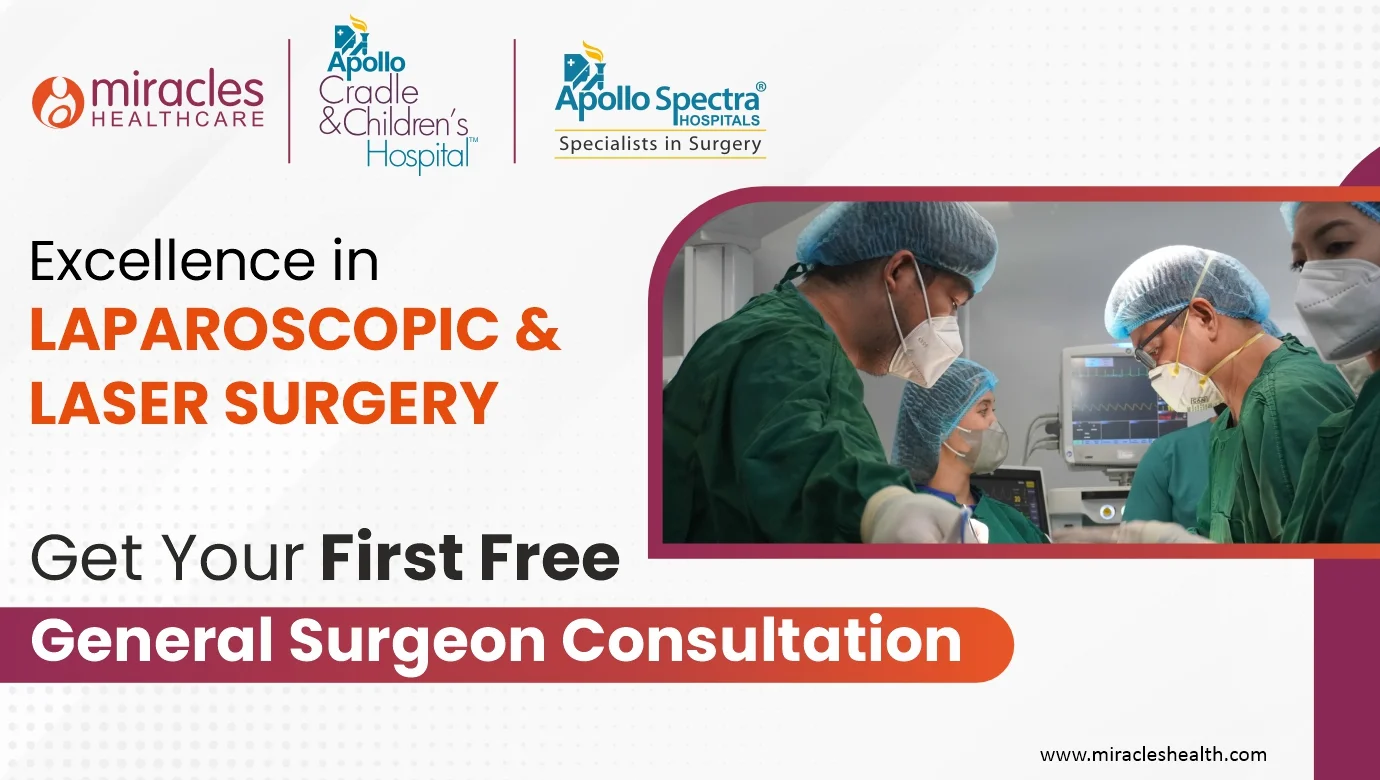General Surgery Conditions We Treat
Comprehensive Care for Your Health

Varicocele is a health condition where the veins inside the scrotum become enlarged, similar to varicose veins that appear in the legs. It is one of the most common causes of reduced sperm production and quality, leading to infertility in men. Treatment options for varicocele may include surgical repair or embolization to improve fertility outcomes.
Varicocele is a condition indicated by the abnormal enlargement of veins within the scrotum, the pouch of skin that holds the testicles. Varicose in the scrotum is similar to varicose veins in the legs, becoming enlarged due to impaired blood flow regulation or faulty valves within the veins. Varicoceles are most commonly found on the left side of the scrotum, possibly due to the anatomy of the veins in that region.
While many varicoceles cause no symptoms, some individuals may experience discomfort, especially if the varicocele is large. One significant concern associated with varicoceles is their impact on male fertility. The increased flow and pooling of blood within the scrotum can lead to increased temperatures, which may impair sperm production and function. This can result in reduced sperm count, motility, and morphology, potentially leading to infertility issues.
Treatment options for varicoceles depend on the severity of symptoms and the desire for fertility. Varicocele surgery, known as varicocelectomy, involves tying off the dilated veins to redirect blood flow. Another approach, called embolization, involves blocking the affected veins using a catheter-based procedure. Both methods aim to restore normal blood flow and potentially improve fertility outcomes in affected individuals.
Varicoceles often do not cause noticeable symptoms and are frequently found incidentally during a routine physical examination. However, the symptoms may include:
Scrotal Pain or Discomfort: A dull ache or feeling of heaviness in the scrotum, especially after prolonged standing or physical activity.
Visible or Palpable Veins: Enlarged veins in the scrotum may appear swollen and twisted, resembling a bag of worms.
Infertility Issues: Reduced sperm quality and quantity, usually leading to difficulties with conception.
Testicular Atrophy: A noticeable shrinkage in the size of the testicles, which may be due to impaired testicular function.
Swelling: Occasionally, there may be noticeable swelling or a lump in the scrotum.
If you experience these symptoms, consult the general surgeon near you as they can help diagnose varicocele and discuss potential treatment options, especially if fertility is a concern.
Varicoceles are more commonly found in adolescents and young adults and typically manifest on the left side due to the anatomy of the veins. There are several factors contribute to the formation of varicocele including:
Faulty Valves: Valves in the veins that regulate blood flow may not function properly, allowing blood to pool and veins to enlarge.
Anatomy: The anatomy of the testicular veins may put some individuals at risk of varicoceles, particularly on the left side where the vein enters at a right angle.
Blood Flow Obstruction: Obstruction or blockage of normal blood flow in the veins can contribute to increased pressure and dilation.
Genetics: There may be a genetic predisposition to varicoceles, as they often occur more frequently in relatives of affected individuals.
Diagnosing varicoceles generally involves a combination of medical history review, physical examination, and sometimes imaging studies. Here is how the diagnosis is typically made:
Medical History: The doctor will inquire about any symptoms you may be experiencing, such as scrotal pain or fertility concerns. They will also ask about your medical history, including any previous surgeries or conditions that may be relevant.
Physical Examination: During a physical exam, the doctor will carefully feel the scrotum while you are standing. They will check for swelling, enlargement, or any unusual masses. Varicoceles are usually described as feeling like a bag of worms when palpated.
Scrotal Ultrasound: If the physical exam offers a varicocele or if there are concerns about fertility, the doctor may recommend a scrotal ultrasound. This imaging test uses high-frequency sound waves to create a picture of the veins in the scrotum. It can confirm the presence of a varicocele, assess its size and severity, and rule out other possible causes of scrotal swelling or pain.
Dynamic Scrotal Thermography: In some cases, dynamic scrotal thermography may be used to assess temperature differences between the affected and unaffected sides of the scrotum. This test can provide additional information about the flow of blood and temperature regulation in the scrotum.
Once diagnosed, the doctor will discuss the best suitable treatment options based on individual preferences, the severity of symptoms, and the impact on fertility. Varicoceles may not always require treatment, especially if they are small and asymptomatic, but monitoring and periodic evaluation are necessary.
Treatment for varicoceles is typically recommended if they are causing symptoms such as pain or discomfort, or if they are affecting fertility. The main treatment options include:
Observation: If the varicocele is small and does not cause any symptoms or fertility issues, your doctor may recommend regular monitoring without immediate intervention. This approach involves periodic check-ups to assess any changes in symptoms or fertility status.
Pain Management Medications: Medications are generally not effective for treating varicoceles themselves. However, pain medications may be prescribed to manage pain and discomfort associated with varicoceles.
Surgical Repair: Varicocelectomy is the most common treatment for varicoceles, especially if they are causing considerable symptoms or affecting fertility. During varicocelectomy, the dilated veins are either tied off or sealed shut to redirect blood flow away from the varicocele. This procedure can be performed using various techniques, including open surgery, minimally invasive laparoscopic, and microsurgical varicocelectomy approaches.
Embolization: In this procedure, a small catheter is inserted into a vein in the groin or neck area, guided to the varicocele, and a coil or other blocking agent is used to seal off the enlarged vein. This is a less invasive alternative to surgery and may be preferred for some patients.
The choice of treatment depends on factors such as the severity of symptoms, impact on fertility, patient age and health, and personal preferences. So, discuss the benefits, risks, and expected outcomes of each treatment option with your surgeon to determine the most appropriate course of action for your situation.
Preventing varicoceles completely may not be possible as several factors such as genetics and anatomical predispositions are difficult to control. However, some preventive measures you may follow in consultation with your surgeon to potentially reduce the risk or severity of varicoceles:
Healthy Lifestyle: Maintaining a healthy weight and regular exercise can promote good circulation and overall vascular health, potentially reducing the risk of varicoceles.
Avoidance of Testicular Trauma: Protecting the testicles from injury or trauma, such as during sports or activities where there is a risk of impact, may help prevent varicoceles.
Proper Posture: Avoiding prolonged periods of standing or sitting, which can increase pressure on the veins in the scrotum, may be helpful.
Varicocele in Adolescents: In adolescents with a diagnosed varicocele and no symptoms or fertility issues, regular monitoring by a surgeon may help identify any changes that may require treatment later on.
Since varicoceles often develop spontaneously and are more common in puberty and early adulthood, regular check-ups with a general surgeon can help detect varicoceles early, monitor their progression, and intervene if necessary to prevent complications such as impaired fertility.
Several factors can increase the risk of developing a varicocele including:
Age: Varicoceles are most commonly diagnosed during puberty and early adulthood, though they can occur at any age.
Anatomy: The positioning of the testicular veins and their drainage into the larger veins can play an important role. Varicoceles are more commonly found on the left side due to the anatomy of the veins, where the left testicular vein drains into the left renal vein at a right angle, making it more susceptible to the pooling of blood.
Genetics: Having a family history of varicoceles may increase the likelihood of developing one.
Increased Intra-abdominal Pressure: Conditions or activities that increase pressure within the abdomen, such as heavy lifting, chronic cough, or constipation, can also contribute to the development or worsening of varicoceles.
Obstruction: Any condition that obstructs the flow of blood in the veins, such as a tumor or cyst, can increase the risk of varicoceles.
Previous Surgery or Injury: Previous surgeries or injuries to the abdomen or scrotum that affect blood flow and drainage may predispose to varicoceles.
Lifestyle Factors: Factors such as obesity, lack of physical activity, and poor posture can also contribute to the development of varicoceles by increasing pressure on the veins in the scrotum.
Understanding these risk factors can help surgeons identify and manage varicoceles more effectively, especially in cases where symptoms or fertility concerns arise.
Miracles Apollo Cradle/Spectra is the best hospital recognized for its specialized care in various medical fields, including general surgery and treatments like varicocele. The hospital boasts a team of highly experienced general surgery doctors in Gurgaon who are equipped to handle varicocele cases with expertise. We offer a complete diagnostic evaluation and utilize advanced treatment options such as varicocelectomy or embolization to address varicoceles effectively. You can expect personalized care and a supportive environment conducive to recovery and improved fertility outcomes.


Comprehensive Care for Your Health
Meet our expert team of General Surgery Doctors where compassionate care meets expertise.
Inspiring Journeys: True Patient Stories
Miracles Healthcare is a leading multispeciality hospital in Gurgaon. We are committed to providing comprehensive and high-quality medical care across all specialties under one roof.






Learn about the world class health care we provide
Source for Expert Advice and Health Tips
Learn about the world class health care we provide
Varicoceles can be treated with surgical procedures like varicocelectomy or minimally invasive techniques such as embolization.
Treatment can effectively correct varicoceles, but recurrence is possible in some cases.
The cost of varicocele treatment can vary widely depending on the type of procedure, geographical location, and surgeon.
Varicocele is usually not life-threatening, but it can cause discomfort, testicular atrophy, or fertility issues if left untreated.
Varicocele typically does not resolve on its own and may continue to worsen over time without treatment.
If left untreated, varicoceles can potentially cause infertility issues due to impaired sperm production and quality.
Varicoceles don’t resolve on their own without intervention; however, conservative management may be recommended in mild cases.
Varicocele is primarily caused by the enlargement of veins in the scrotum because of malfunctioning valves that allow blood to pool instead of flowing properly.
Yes, varicocele can be treated with surgical procedures or minimally invasive techniques to repair the affected veins.
Yes, varicocele can reduce sperm count, motility, and quality, potentially affecting male fertility.